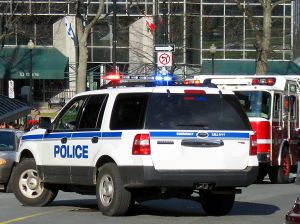Our Boston drunk driving accident lawyers know that it is extremely important to get drunk drivers off the road before they cause an accident or hurt themselves or others. Of course, the needs of the public to stop drunk drivers must be balanced against constitutional protections, including the right to be free from unlawful search and seizure. 
Unfortunately, according to NECN.com, a decades-old law has created a loophole allowing for drunk drivers to get away with driving while impaired. The loophole has been described by police in Massachusetts as hamstringing law enforcement efforts aimed at “stopping the highway carnage caused by drunk drivers.” Safety advocates and law enforcement officials argue that the loophole needs to be changed to make the roads safer.
Loophole Makes Stopping Drunk Drivers Difficulty
The loophole stems from a 1990 decision made by the Massachusetts Supreme Judicial Court, which ruled that if an offending motorist crosses town lines, police have no authority to pursue and stop the motorist for a non-arrestable traffic violation if the motorist has crossed out of the officer’s jurisdiction.
Under the law, police are allowed to pursue a driver across town lines if they believe that the motorist is intoxicated, such as when the driver is weaving in and out of his lane. Drunk driving is an arrestable offense, so a police officer can pursue and stop the suspected drunk driver even if the motorist has crossed the boundary into another officer’s jurisdiction.
However, if there is a civil violation that turns up drunk driving, evidence could be lost if the driver has crossed a town line. For example, a law enforcement officer may see someone speeding or driving without headlights and could pursue the offender for this minor traffic offense.
When an officer pulls someone over in such a situation, normally the officer can take action if the motorist seems impaired. For example, if the motorist cannot easily provide the registration or his license because he is impaired by alcohol, or if the officer smells alcohol on the motorist’s breath, the officer could have the driver submit to a BAC test. Evidence from the blood-alcohol content test or the driver’s behavior at the time of the traffic stop could be used to make a drunk driving case.
If the offending car has crossed the town lines, however, the officer is prohibited from approaching the car door. The Executive Director of the Massachusetts Chiefs of Police reports that this has the effect of causing the officers to “lose all of the evidence for any crime, whether it be drugs or guns or anything else.”
Police are trying to change this rule by eliminating the loophole, with about 100 police chiefs from across the state appearing before the Joint Committee on the Judiciary in support of a bill that would make change to the law. Such bills have been proposed in the past but not made it out of committee.
Hopefully, with the support of police chiefs, the laws will be changed to make it easier for law enforcement to protect motorists from serious and potentially fatal drunk driving accidents.
If you or a loved one was involved in a drunk driving accident in Massachusetts, call Jeffrey Glassman Injury Lawyers for a free and confidential appointment — (617) 777-7777.
More Blog Entries:
Intoxicated Pedestrian Fatalities Rising Nationwide, Boston Drunk Driving Accident Lawyer Blog, August 14, 2013
 Boston Drunk Driving Accident Lawyer Blog
Boston Drunk Driving Accident Lawyer Blog

